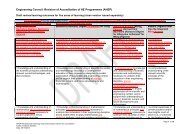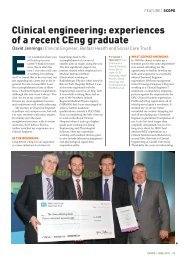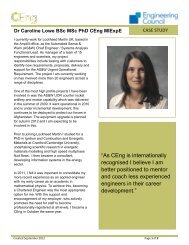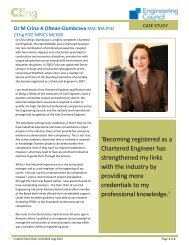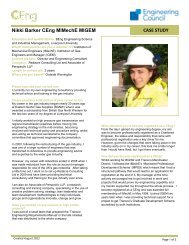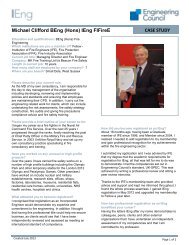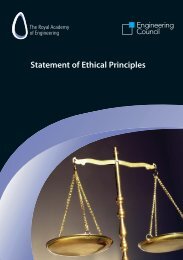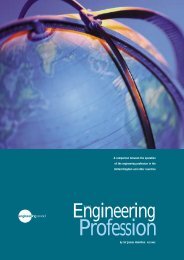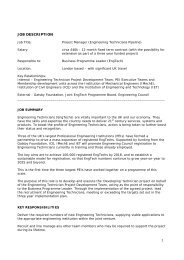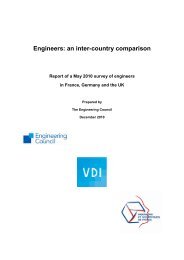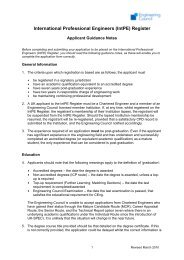An Engine for Change - A Chronicle of the Engineering Council
An Engine for Change - A Chronicle of the Engineering Council
An Engine for Change - A Chronicle of the Engineering Council
Create successful ePaper yourself
Turn your PDF publications into a flip-book with our unique Google optimized e-Paper software.
62A CHRONICLE OF THE ENGINEERING COUNCILcareers guidance, learned society functions <strong>for</strong> all engineering disciplines, engineeringlibraries, and become focal points <strong>for</strong> industry-education links and even <strong>for</strong> training andexaminations, with each having its own Continuing Education and Training Adviser. TheNorth East had already set up <strong>the</strong> first one in Newcastle upon Tyne with support fromNor<strong>the</strong>rn <strong>Engine</strong>ering Industries and <strong>the</strong> North East Coast Institution <strong>of</strong> <strong>Engine</strong>ers andShipbuilders. By <strong>the</strong> end <strong>of</strong> 1989 ano<strong>the</strong>r had been put in hand with support from BT at LongAston near Bristol.The activities <strong>of</strong> <strong>the</strong> nineteen ECROs continued to develop markedly during 1989. Fifteen <strong>of</strong><strong>the</strong> nineteen now had Regional Offices, each with secretarial support and data-handlingfacilities. By <strong>the</strong> end <strong>of</strong> 1990 eighteen <strong>of</strong> <strong>the</strong>m [that is, all but one] had <strong>of</strong>fices. The schemewas being successfully put in place by <strong>the</strong> EngC from London but, as activities continued todevelop, more volunteer Registrants were urgently needed to help with ECRO activity. It wasanticipated that during 1990 <strong>the</strong> ECROs would be able to link into <strong>the</strong> EngC’s RegionalAffiliates and enable <strong>the</strong> ECROs to enhance links between Registrants and local activities[Industrial Affiliates had been re-branded as Industry Affiliates from 1989, as we shallexplain below.] The success <strong>of</strong> <strong>the</strong> ECROs was, as it sadly transpired, not to be continued as<strong>the</strong>y fell into o<strong>the</strong>r hands as will be seen later in this <strong>Chronicle</strong>.The SCRA made a significant contribution to <strong>the</strong> EngC’s work in 1990. Still under <strong>the</strong>chairmanship <strong>of</strong> Dr Gordon Beveridge, <strong>the</strong> Committee reviewed <strong>the</strong> <strong>Engine</strong>ering Assemblyand <strong>the</strong> EngC’s regional structure that had been established in 1984. The SCRA decided thatRegional Administrative Centres, similar to <strong>the</strong> Nor<strong>the</strong>rn <strong>Engine</strong>ering Centre at Newcastleupon Tyne, should service <strong>the</strong> regions. The Midlands was considered as <strong>the</strong> next possibility.However, <strong>the</strong> growing number <strong>of</strong> ECRO activities, <strong>the</strong> launch <strong>of</strong> <strong>the</strong> Neighbourhood<strong>Engine</strong>ers scheme, and <strong>the</strong> spread <strong>of</strong> CET limited <strong>the</strong> number <strong>of</strong> SCRA centres that <strong>the</strong> EngCcould support and finance. As only eleven could be af<strong>for</strong>ded, <strong>the</strong> SCRA proposed that <strong>the</strong>ECRO boundaries should be rearranged to encompass a complete number <strong>of</strong> local educationauthorities, and so facilitate SCRA activities. This proposal was put <strong>for</strong>ward <strong>for</strong> discussion at<strong>the</strong> 1991 <strong>Engine</strong>ering Assembly.Interfacing with SchoolsWISETo promote <strong>the</strong> WISE campaign [now four years old and continuing to be led by EngC seniorexecutive Marie-Noëlle Barton] <strong>the</strong> earlier, 1984, targets <strong>of</strong> girls, women and employers werebroadened in 1988 to include parents, teachers and careers’ advisers. A poster ‘<strong>Engine</strong>ering –A Woman’s Touch’ was produced with schoolgirls specifically in mind and circulated to allBritish secondary schools in September 1988. The poster was also circulated to 7,000 youthclubs via <strong>the</strong> ‘Youth Clubs’ magazine <strong>for</strong> display to <strong>the</strong> 750,000 youngsters attending suchclubs each week, and supplied to a third <strong>of</strong> <strong>the</strong> doctors’ surgeries and health centres in <strong>the</strong>United Kingdom <strong>for</strong> <strong>the</strong>ir waiting rooms. A video promoting career breaks <strong>for</strong> women whowere existing Chartered or Incorporated <strong>Engine</strong>ers was awarded a Certificate <strong>of</strong> Merit by <strong>the</strong>British Association <strong>for</strong> <strong>the</strong> Advancement <strong>of</strong> Science at its annual film and TV awardsceremony. Following this publicity <strong>the</strong> video, ‘The O<strong>the</strong>r Half’, financed by <strong>the</strong> ManpowerServices Commission, was made available from <strong>the</strong> EngC <strong>for</strong> purchase at £5.75 or on freeloan <strong>for</strong> a month.© <strong>Engine</strong>ering <strong>Council</strong> UK 2004



